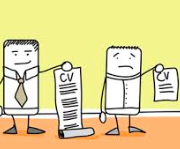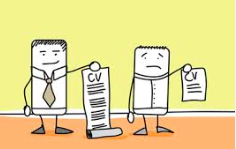CV: how long is too long?
The length of your CV can be crucial in determining whether you get the interview. So, how long should a CV be? Think about it: if you were the recruiter, and you have more than 100 of them to read in one morning, how much time would you want to dedicate to reading each? Would you prefer to spend ages on them or access the useful information as quickly as possible? The key is to make your CV stand out and grab the recruiter’s attention fast, when he is still reading the first top 1/3 of the page of your CV. It’s just like the back cover of a book: a well written introduction will attract the reader to continue with the rest of it.
Remember:
- This is not an autobiography you’re writing. So keep your CV short. Though there are some pretty strong opinions out there about CV length, there is no absolute rule. Generally speaking, keeping it to one or two pages is fine.
- The main aim of your CV is to convey the information required in a clear and efficient manner. That means cutting out anything that is simply unnecessary.
To start with, ask yourself these key questions that will guide you to optimize the length of your CV and make it impactful.
1) Is it all relevant?
You don’t need to include everything. You are advertising yourself for a role, and your CV is a teaser, a hook so the recruiter should be intrigued and will want to know more about you. You don’t have to give your life story. Take your employment history: if you are applying for a Senior VP position, probably your summer jobs during your university time is not the kind of information the recruiter will look for. . . . . Unless you’re applying for a job in the same industry/field, etc.
The same goes for your skills and competences: it’s easy to know which ones the recruiter is looking for. They are in the job ad. So, focus on them.
2) Are you repeating yourself?
Don’t bore them. When writing your CV, it’s tempting to try to make the same points. However, if you write that you are creative, maybe there is no added value in mentioning that you are also innovative, ingenious, or inventive. If the point is clear, why to make it again?
Or, If you had several jobs that involved doing more or less the same thing, do you need to list the position’s responsibilities for each of them? You can mention them under one bullet point.
3) Is your CV reader friendly?
Use white spaces. They make the text reader friendly, and it allows the reader to breath. Don’t try to stuff as much information as possible in your CV. It suggests clutter. Look at print advertisements that you think are effective and catch your eye. Have you remarked how much space isn’t covered by text or images? This is carefully planned to make you move your eyes to what the ad is trying to sell or say.
4) Do you usually read your CV out loud?
If you don’t, then start doing it. It is an excellent way to catch and correct repetitions in your writing, and sentences that sound awkward. If you stumble over a particular paragraph while reading it, probably there’s something unclear or not smooth that is worth re-writing.
5) Do you use your cover letter wisely?
Your cover letter does not repeat your CV. On the contrary, it complements it. It allows you to expand on some points of the CV, it demonstrates your interest in the position and the employer to which you are applying, and it explain why you think you are the right candidate for the job.
Nowadays you also have the opportunity of using your Linked-In profile to go beyond your professional profile and show what you do outside of work. There you can add volunteer work, hobbies, causes that you care about, affiliations, and more. You can also include presentations, and publications. Use it, but don’t abuse of it. Always keep it professional.
It’s not just about size. It’s what you write and how you present it that will make the difference.
Don’t miss the opportunity to be impactful. Craft your CV into a powerful and lean business card that is sure to catch and retain the recruiter’s attention.




